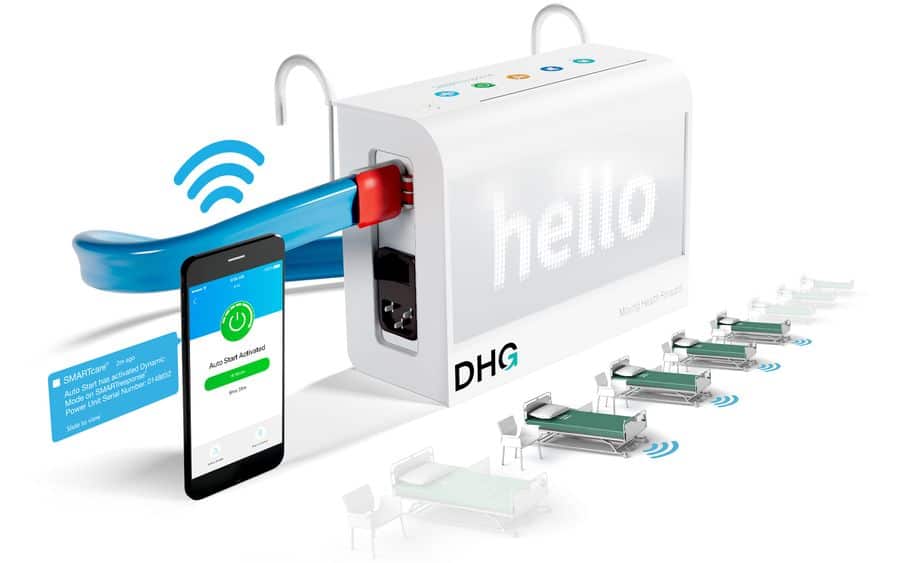EXCLUSIVE: DHG CEO on the “much welcomed” global boom in healthcare innovation

A global boom in healthcare innovation is coming but we need to ask whether our health tech industry is ready for it. Graham Ewart, CEO of Direct Healthcare Group (DHG), which specializes in the manufacture of medical devices, products and solutions for patients with limited mobility, shares his insights exclusively with THIIS…
Last month’s court verdict for Theranos founder, Elizabeth Holmes, was a difficult, industry-spanning embarrassment for the health tech sector.
Having watched HBO’s 2019 documentary on the saga (The Inventor: Out For Blood in Silicon Valley), I had followed the case closely and to this day find it hard to believe such unqualified, unproven claims could have merited the level of investment Holmes was able to achieve in the company’s short life span.
As reported in The Guardian, Holmes had founded Theronos after dropping out of Stanford at 19 years old, promising a revolutionary technology that could run hundreds of health tests on just a drop of blood.
Initially hailed as a visionary, Holmes attracted big-name investors including the former secretaries of state George Shultz and Henry Kissinger, and at its height, Theranos was valued at more than US$9 billion, until a Wall Street Journal investigation in 2015 revealed that its in-house tests had massive inaccuracies, and that the company was performing other tests using traditional blood drawing methodology and outside labs.

Holmes was found guilty on four of 11 charges of fraud, including conspiracy to defraud investors. At the time of writing, sentencing for Holmes has yet to take place.
Importance of EU MDR
It’s difficult to understand what Holmes could have said and done to attract the huge swathes of investment on such a questionable product.
I believe the lack of due diligence could somewhat be explained by our human instincts and innate desires to improve global health outcomes, and from an investor’s perspective, a natural aspiration to be a part of any groundbreaking, emerging innovation which seeks to do this, even if the inner workings of a product are kept at arm’s length.
Additionally, the saga proves how imperative the introduction of the EU MDR regulations are for the healthcare sector. While the directive has led to huge administrative pressures and inevitable delays in product launches, ensuring that European-based medical device manufacturers cannot make baseless claims is an absolute necessity, and demonstrates the importance of independent clinical evidence (our own Mercury Advance product, for example, has over 25 pieces of published clinical evidence).
It’s only in the past few decades that our ideas of innovation in healthcare have significantly changed to incorporate technological devices, AI, VR and robotics.
Previously, our ideas of developments would have been drug related, such as medicinal treatment for previously untreatable conditions.
And while both avenues continue to progress at astounding rates, we must not let setbacks or fraudulent innovations, such as Theranos, affect our ability, and our customer’s ability, to see the benefits of investing in progression.
Opening doors
Only a couple of weeks after Holmes’ verdict, news came out of the University of Maryland about the world’s first successful pig-to-human heart transplant.
Much like the furore around Dolly the Sheep in the 90’s, there have been some ethical and moral questions, however the opportunities this treatment creates (should it be successful in the medium to long term) are endless. I have no doubt it will be decades before we see a scale up of such experiments, but the doors this opens are increased.
We’re also seeing significant advances across general healthcare diagnoses (such as virtual consultations as I’ve previously discussed), at-home diagnosis products (propelled by the public’s ease in adopting at-home testing for COVID) and remote products relying on digitalisation.
Our own remote monitoring surface system, the Dyna-Form SMARTresponse, does just this. The product has been designed to provide digital smart-technology care for pressure ulcer prevention and a first of its kind in the UK.
The product integrates remote digital technology with an existing award winning hybrid support surface to continuously monitor patients and automatically or remotely intervene when increased risk is sensed due to a period of non-movement being detected.
Its remote access capabilities allows for patient monitoring even when clinicians cannot be physically present, via the product’s uniquely designed smartphone app, enabling them to remotely alter pressure distribution at the earliest intervention and alerting them to possible patient issues.
The SMARTresponse has already been placed into 12 trial facilities across the UK to aid patients with effective pressure relief and we look forward to rolling this out further in 2022.
Other manufacturers moving into the digitalisation field also include Teva, an Israeli drug company which dates back to 1901, which has developed a digitally enabled inhaler equipped with app-connected sensors that tell users if they are employing it properly.
These global moves to bring healthcare into the 21st century are much welcomed, and I predict that as we begin to move into endemic status, we will see a boom in healthcare innovation.
I have no doubt that disruptors will seek to counter the mistakes made across the world surrounding COVID, both in terms of faster diagnoses, treatment and the ability to predict transmissions.
This, along with a natural progression in technology and digitalisation will create products we could only have dreamed of a decade ago. Although the past 24 months have been devastatingly tough for all involved in our health sector, I’m extremely excited for the future of our industry.


